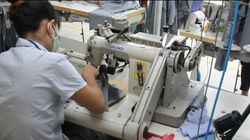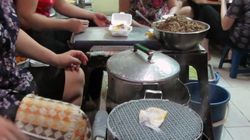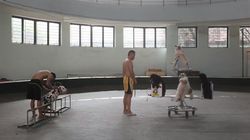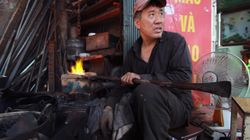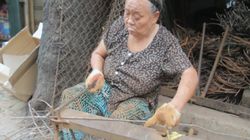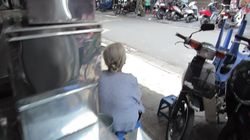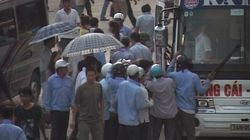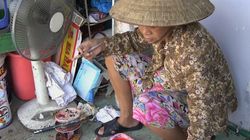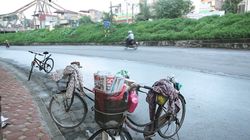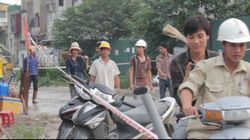Hanoi|Vietnam
Statistical Data
Google entries for Hanoi + Hà Nội 278,2 million
Google entries per inhabitant (urban) 96,193
City Founding 1010
http://de.wikipedia.org/wiki/Hanoi
POPULATION
City area 2.89 million (2011) [1]
Province 6.8 Mio. [2]
Hanoi Capital Region 12.46 million (2006) [3]
[1] http://www.gso.gov.vn/default.aspx?tabid=387&idmid=3&ItemID=12869
[2] Statistical Handbook of Vietnam 2012; http://www.gso.gov.vn/default_en.aspx?tabid=515&idmid=5&ItemID=13700
[3] http://en.wikipedia.org/wiki/Hanoi_Capital_Region
Surface Area
2008, before the local government reorganization 920 km² [1]
after the reorganization 3.324 km² [2]
thereof agriculturally used ca. 2/3 [3]
Hanoi Capital Region 13,436 km² [4]
[1] http://academia.edu/1784635/Peasants_or_Peddlers_Mobile_Street_Vendors_in_Hanoi_Vietnam
[2] http://en.wikipedia.org/wiki/Hanoi
[3] http://www.vrm.ca/documents/Hanoi_Urbanization.pdf
[4] http://en.wikipedia.org/wiki/Hanoi_Capital_Region
Population Density (inhabitants / km²)
Total 1.875 [1]
City area 27.200 [2]
Historical Centre 40.400 [2]
[1] http://de.wikipedia.org/wiki/Hanoi
[2] http://www.utwente.nl/ctw/vvr/education/Master/finished_graduation_projects/afstudeerders_per_jaar_2/pdf/2013_Peter_Sanders.pdf
Population / region (2009)
Total 6,451,909
Countryside 3,816,750
City 2,632,087
http://www.vietnamonline.com/az/hanoi-population.html
CLIMATE DATA
Max. temperature Ø 27,0
Min. temperature Ø 20,9
Rainfall / year (mm) 1.676,2
Days of rain 144,5
http://en.wikipedia.org/wiki/Hanoi
Gender ratios (Vietnam)
at birth 1.12 men / women
0-14 1.1 men / women
15-24 1.07 men / women
25-54 1 men / women
55-64 0.83 men / women
65 and older 0.62 men / women
Total population 1 man / woman (estimated 2013)
https://www.cia.gov/library/publications/the-world-factbook/geos/vm.html
Life expectancy (Vietnam)
Total population 72,6 years
Men 70,2 years
Women 75,4 years
https://www.cia.gov/library/publications/the-world-factbook/geos/vm.html
Degree of urbanisation (Vietnam)
2002 24,00%
2012 34,00%
In comparison
with Germany 74,00%
World 50,50%
http://www.asiantrendsmonitoring.com/2012/10/12/bulletin-18/
ECONOMY
Economic growth (Vietnam)
1992 - 1997 over 8% on average
2000 - 2007 over 7% on average
2012 5%
http://www.imove-germany.de/cps/rde/xchg/imove_projekt_de/hs.xsl/vietnam.htm?news-type=&content-url=/cps/rde/xchg/imove_projekt_de/hs.xsl/17478.htm
Inflation rate (Vietnam)
2008 23%
2011 18,6%
2012 9,7%
http://www.imove-germany.de/cps/rde/xchg/imove_projekt_de/hs.xsl/vietnam.htm?news-type=&content-url=/cps/rde/xchg/imove_projekt_de/hs.xsl/17478.htm
Relation of agricultural and industrial production (Vietnam)
Share of agriculture in total GDP 2002 25%
Share of agriculture in total 2010 20%
Share of industry in total GDP 2002 36%
Share of industry in total GDP 2010 40%
Vietnam’s GDP has tripled between 2002 und 2010.
http://libcom.org/library/class-struggle-vietnam-colonial-yoke-wage-slavery-global-capital
The 10 biggest vietnamese companies 2012
- Vietnam National Oil and Gas Group (PetroVietnam; state-operated)
- Vietnam National Petroleum Corporation (Petrolimex; state-operated)
- Vietnam Posts and Telecommunications Group (VNPT; state-operated)
- Samsung Electronics Vietnam Limited Company
- Vietnam-Russia Oil and Gas Joint Venture (Vietsovpetro; state-operated)
- durch das Militär geführte Telecom Group (Viettel; state-operated)
- Saigon Jewellery Limited Company (SJC)
- The Electricity of Vietnam Group (EVN)
- Vietnam National Coal-Mineral Industries Group (Vinacomin; state-operated)
- Vietnam Bank for Agriculture and Rural Development (Agribank; state-operated)
http://www.dtinews.vn/en/news/018/26573/state-owned-firms-dominate-list-of-vietnam-s-top-companies.html
State-operated Companies (Vietnam)
Total loss 2012 82.6 million. EUR
Total debth 11.7 billion EUR
Total turnover 58.2 billion. EUR
http://www.saigon-gpdaily.com.vn/business/2013/1/103970/
Unemployment rate 2012
Vietnam 2,74%
Hanoi 2,15%
http://en.vietnamplus.vn/Home/Vietnam-reports-nearly-1-million-unemployed-people/201212/30678.vnplus
Employees per sector (Hanoi)
Agriculture, Forestry, Fishing 24,4%
Industry and Construction 28,3%
Public services 47,3%
State-operated Companies 19,4%
Private Companies 77,9%
Foreign Companies 2,6%
http://www.gso.gov.vn/default_en.aspx?tabid=515&idmid=5&ItemID=13474
Textile and garment industry (Vietnam)
Employees in the textile and garment industry over 2 million
Employees in the electronics industry ca. 120.000
https://www.usaita.com/pdf_files/WRC-Report-Vietnam.pdf
Vietnam General Confederation of Labour
The Vietnam General Confederation of Labour (VGCL) is the only trade union organization officially recognised in Vietnam. [...] The status of the VGCL as a trade union that represents not only its members but the whole working class of the country is sealed by Article 10 of the 1992 Constitution. At the end of 2007, the VGCL reported a total membership of six million, which accounted for 13.3 per cent of the total labour force. [...] The union membership in the state-owned and civil service sectors was 90 per cent.
http://www.ilo.org/wcmsp5/groups/public/---ed_dialogue/---dialogue/documents/publication/wcms_194680.pdf
The denial of associational rights to Vietnamese workers is rendered worse by the fact that not only is the organizing of independent unions legally prohibited, but the official union structure is also de facto dominated at the factory level by employers themselves. This is because enterprise-level union officials are typically chosen by factory managers, not workers, and are, most commonly, actually the company’s human resource managers.
https://www.usaita.com/pdf_files/WRC-Report-Vietnam.pdf
Wild Strikes (so called „wild cat strikes“ in Vietnam)
2007 700 [1]
2008 762 [1]
2009 218 [1]
2010 424 [1]
2011 981 [2]
[1] http://libcom.org/library/class-struggle-vietnam-colonial-yoke-wage-slavery-global-capital
[2] https://www.usaita.com/pdf_files/WRC-Report-Vietnam.pdf
The role of enterprise unions, as promoted by the authorities, is to act as ‘the bridge of communication’ or a mediating body between employers and workers rather than the representative of workers’ interests in opposition to employers. Unsurprisingly, none of the strikes in the last 13 years was organised by the official unions.
http://www.esrc.ac.uk/my-esrc/grants/RES-155-25-0071/outputs/Download/c8114d8a-52aa-4acb-9316-deff89fc3028
“The key difference between Vietnam and China is that the All-China Federation of Trade Unions is being pushed by the Communist party to take on the work of representing workers and controlling the situation,” says Mr Yoon. Although they are not typically supporters of enhanced labour rights, some factory managers in Vietnam also want to see stronger worker representation to ensure better lines of communication.
“Our workers went on strike after their rice portions were cut by the catering contractor who was trying to save money because of inflation,” says one European factory manager. But because the official trade union was not acting as an effective communication channel, the company had no way of knowing about the problem until it was too late, he says.
http://www.ft.com/intl/cms/s/0/67380b5c-427e-11e1-97b1-00144feab49a.html#axzz2dBbR6mWv
Industrial Safety (results of factory visits in the frame of ILO-Better-Work-Vietnam-Programs)
27% of the inspected factories emergency exits that were closed or difficult to access. In 32% of the inspected factories the workers had no necessary protective clothing. In 23% of the inspected factories workers have been exposed to dangerous levels of chemicals.
https://www.usaita.com/pdf_files/WRC-Report-Vietnam.pdf
Of factories audited for the FLA (Fair Labor Association) between 2009 and 2011, 80% violated basic requirements related to emergency evacuation, with common violations including blocked aisles and locked exits, lack of fire alarms and smoke detectors, and failure to conduct fire drills or test electrical systems. Seventy percent of factories audited for the FLA during this period also failed to provide workers with required personal protective equipment, and 52% had not installed necessary guards on machinery.
https://www.usaita.com/pdf_files/WRC-Report-Vietnam.pdf
INFORMal SECTOR (Definition)
A firm is classified as informal if it belongs to households and is not registered under factories or commercial acts, tax or social security laws, professional groups’ regulatory acts or similar acts, laws or regulations established by national legislative bodies” in the statistical or tax institution or if it does not keep written accounts.
http://wiego.org/sites/wiego.org/files/publications/files/Herrera_WIEGO_WP9.pdf
Informal work in Hanoi per amount of employees (2007)
Formal agricultural sector 3.495 employees
Informal agricultural sector 205.582 employees
Formal non-agricultural sector 738.303 employees
Informal non-agricultural sector 635.016 employees
http://wiego.org/sites/wiego.org/files/publications/files/Herrera_WIEGO_WP9.pdf
Informal work in Hanoi (activity in percent, 2007)
Agriculture 24,46%
Commerce 26,22%
thereof street trading 11,33%
Public services 26,86%
Construction 6,79%
Manufacture 15,67%
Home work 33,54%
http://wiego.org/sites/wiego.org/files/publications/files/Herrera_WIEGO_WP9.pdf
Informal work in Hanoi (employees in percent, 2007)
informal sector 53,12%
formal sector 46,88%
http://wiego.org/sites/wiego.org/files/publications/files/Herrera_WIEGO_WP9.pdf
Street vendors (2007)
6% of all employees
11% of all employees in the informal sector
http://wiego.org/informal-economy/occupational-groups/street-vendors
TRAFFIC
Motor schooter
80% of all household own 1 motor scooter
40% of all household own 2 motor scooters
of 1.000 inhabitants 600 own a motor scooter
http://www.codatu.org/wp-content/uploads/ALLAIRE-CODATU_Hanoi-EN.pdf
Growth rate of permits
Cars 21%
Motor schooter 13%
http://www.codatu.org/wp-content/uploads/ALLAIRE-CODATU_Hanoi-EN.pdf
Relation of the street networks to surface area
Hanoi 7%
Larger Chinese cities 11%
European cities 15%
http://www.vrm.ca/documents/Hanoi_Urbanization.pdf
Modal share (in %)
Motor scooters 1995 37 2008 81
Cars 1995 1 2008 4
Bicycles 1995 47 2008 2
Buses 1995 2,5 2008 11 (2012 15%) [2]
Other 1995 12,5 2008 2
http://www.codatu.org/wp-content/uploads/ALLAIRE-CODATU_Hanoi-EN.pdf
[2] http://en.hanoi.vietnamplus.vn/Home/Hanois-bus-drivers-told-to-ease-up/20128/2501.vnplus
PUBLIC TRANSPORT
Bus lines 58
Bus stops 1.200
Passengers / daily 1,3 Mio
http://en.hanoi.vietnamplus.vn/Home/Hanois-bus-drivers-told-to-ease-up/20128/2501.vnplus
Development of bus user figures
2000 31 lines with ca. 11 million passengers
2005 47 lines with ca. 300 million passengers
2010 65 lines with ca. 450 million passengers
http://www.codatu.org/wp-content/uploads/ALLAIRE-CODATU_Hanoi-EN.pdf
Metro (planned)
5 lines until 2030
Completion of the 1st line presumably 2015
http://www.afd.fr/lang/en/home/pays/asie/geo-asie/afd-vietnam/projets-vn/transports/projet-de-ligne-pilote-de-transport-ferre-urbain-nhon-gare-de-hanoi-1
WAGES
Average income for wage owner (3. quarter 2012)
Hanoi, urban
Men 5.805.900 VND (209,52 EUR)
Women 5.281.200 VND (190,55 EUR)
Vietnam
Men 3.924.200 VND (141,57 EUR)
Women 3.532.000 (127,48 EUR)
http://www.gso.gov.vn/default_en.aspx?tabid=515&idmid=5&ItemID=13669
A 2012 study by the VGCL’s Institute of Workers and Trade Unions found that wages for workers in the footwear industry averaged only $124 per month, less than the average monthly wage figure for workers in all formal sec tor industries ($136), and the lowest wage of any sector surveyed. According to the VGCL survey, the average wage for a footwear worker provided barely half of the amount the average family of three needed to cover food expenses alone ($220 per month).
http://www.usaita.com/pdf_files/WRC-Report-Vietnam.pdf
Minimal wage / month (2013)
Zone 1, Hanoi urban VND 2.35 million (84,77 EUR)
Zone 2, Hanoi rural VND 2.1 million (75,74 EUR)
http://talkvietnam.com/2012/12/vietnams-wage-growth-higher-than-average-ilo/#.UeUFB23pzTo
Denying workers the wages and benefits they are legally due is a pervasive violation in Vietnam’s export apparel sector. Factory inspections by the ILO’s Better Work Vietnam program found that 19% of factories failed to pay the legal minimum wage for workers’ regular hours, and that 30% did not provide workers with the mini mum legal compensation for overtime hours.
https://www.usaita.com/pdf_files/WRC-Report-Vietnam.pdf
Official poverty line (2012)
In rural areas VND 400,000 = 14,42 EUR / month [1]
In city areas VND 653,000 = 23,25 EUR / month [2]
Households in Hanoi below the poverty line 59,360 [3]
thereof in rural areas 51.900 [3]
[1] http://english.vov.vn/Society/Development/Vietnams-poverty-line-getting-close-to-global-level/261291.vov
[2] http://www.asiantrendsmonitoring.com/2012/10/12/bulletin-18/
[3] http://english.vov.vn/Society/Development/Hanoi-aims-to-lower-poverty-rate/253885.vov
It takes a minimum of VND 1,000,000” (approximately US $50) for a person to survive for a month in Hanoi, while the current urban poverty line is set at VND 653,000 (US $32.65)
http://www.asiantrendsmonitoring.com/2012/10/12/bulletin-18/
LIVING COSTS
Prices (in EUR)
12 eggs 1,68,-
1 kg tomatoes 0,52,-
Bread for 2 persons (1 day) 0,53,-
0,5 l beer in a super market 0,59,-
1 l milk 1,05,-
Cleaning woman / 1 hour 3,85,-
Monthly rent for a 85 qm-flat
in an expensive neighbourhood 525,-
1 l petrol 0,72,-
Monthly ticket for public transport 5,41,-
Cab ride (8 Km) 4,01,-
http://www.expatistan.com
INTERNET
Internet users (Vietnam, 2012)
2000 2 million
2012 31 million
Age 15-22 (Hanoi) up to 95%
80% of the young Vietnamese have at least one social-network-account.
Facebook users more than 10 million
http://www.fidh.org/IMG//pdf/bloggers_report_in_english.pdf
Prison penalties against vietnamese bloggers for „Spreading anti-state propaganda“,
for example, September 09, 2012
Nguyễn Văn Hải 12 years (afterwards 5 years of house detention)
Ms. Tạ Phong Tần 10 years (anfterwards 3 years of house detention)
Phan Thanh Hải 4 years
http://www.fidh.org/IMG//pdf/bloggers_report_in_english.pdf
More than 850 newspapers and magazines, 68 radio stations, thousands of news websites and 80 e-newspapers in Vietnam are all run by Party-controlled, military or government agencies.
http://www.fidh.org/IMG//pdf/bloggers_report_in_english.pdf


